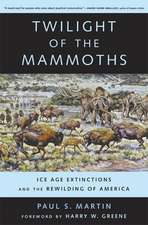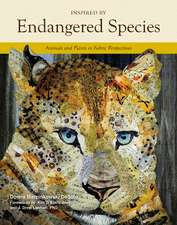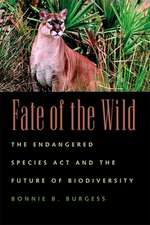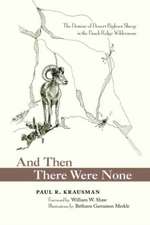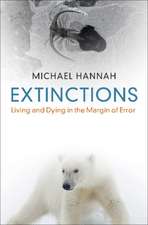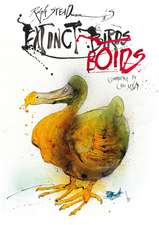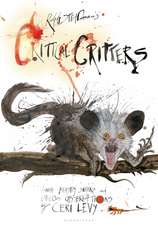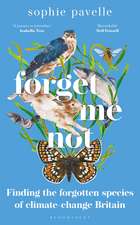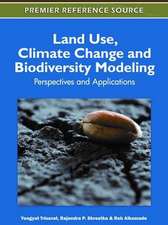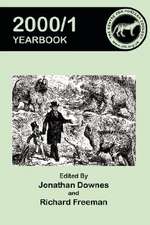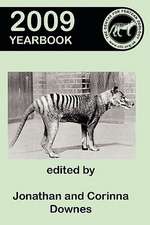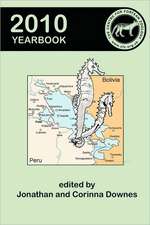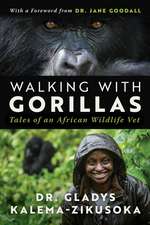The Missing Lynx: The Past and Future of Britain's Lost Mammals
Autor Ross Barnetten Limba Engleză Paperback – 22 iul 2020
Preț: 58.08 lei
Preț vechi: 75.60 lei
-23% Nou
Puncte Express: 87
Preț estimativ în valută:
11.12€ • 12.08$ • 9.34£
11.12€ • 12.08$ • 9.34£
Carte disponibilă
Livrare economică 31 martie-14 aprilie
Livrare express 15-21 martie pentru 38.39 lei
Preluare comenzi: 021 569.72.76
Specificații
ISBN-13: 9781472957351
ISBN-10: 1472957350
Pagini: 352
Ilustrații: 8-page colour section
Dimensiuni: 129 x 198 x 17 mm
Greutate: 0.26 kg
Editura: Bloomsbury Publishing
Colecția Bloomsbury Wildlife
Locul publicării:London, United Kingdom
ISBN-10: 1472957350
Pagini: 352
Ilustrații: 8-page colour section
Dimensiuni: 129 x 198 x 17 mm
Greutate: 0.26 kg
Editura: Bloomsbury Publishing
Colecția Bloomsbury Wildlife
Locul publicării:London, United Kingdom
Caracteristici
Two topics discussed in this book - the cloning of extinct animals and the reintroduction of large mammals (particularly carnivores) to modern Britain - are of significant public interest, with the topic of 'rewilding' frequently appearing in mainstream media
Notă biografică
Ross Barnett is a palaeontologist with a PhD in Zoology from the University of Oxford. He specialises in seeking, analysing and interpreting ancient DNA, but his area of expertise is the genetics and phylogeny of cats, especially extinct sabretooths. Barnett's research has led to many remarkable findings in recent years and involved investigating escaped lynx in Edwardian Devon, rubbishing claims that the yeti is an ice-age polar bear and seeking the ancestral home of the enigmatic Orkney vole. In 2018, he received the Palaeontological Association's Gertrude Elles Award for Public Engagement. Ross lives in the Highlands of Scotland with his wife and two daughters.
Cuprins
PrologueChapter 1: The PastChapter 2: Cave HyenaChapter 3: Sabretooth CatChapter 4: Cave LionChapter 5: WoolliesChapter 6: Irish ElkChapter 7: BovidsChapter 8: BearsChapter 9: Northern LynxChapter 10: Grey WolfChapter 11: Eurasian BeaverChapter 12: The FutureAfterwordAppendixAcknowledgementsFurther ReadingIndex
Recenzii
As elegies go, The Missing Lynx is an awful lot of fun.
Rewilding is certainly romantic but is it practical or even desirable? It all needs thinking through, and Barnett, who makes a compelling case in favour of the idea, can help.
The Missing Lynx is a joyous rabbit-hole to venture down.
Barnett's writing is clear and unobtrusively witty ... And the book is full of cheery, Terry Pratchett-esque footnotes.
Fresh and assured ... An often moving tribute to lost marvels.
A cracking read and rather heartbreaking to think about all those megafauna we pushed over the edge. Highly recommended!
In short, I absolutely loved this book. It . weaves together stories of incredible natural history (the amazing ways in which species live or lived), cutting-edge scientific research, and tales from museum storerooms, as well as positive insight into environmental conservation. Never have I seen footnotes so well utilised to add real story, detail and humour.
His writing is full of admiration for the resourcefulness of Palaeolithic tribespeople - his descriptions of an Ice Age economy that ran on mammoths, and of the mammoth hunts themselves, are evocative.
The Missing Lynx is one of those rare popular science books that manages to serve up a hearty plate of captivating science with a delicious side of escapism.
A wonderful and haunting book: so rich in detail that the mammals of Britain's past seem brought to life again, and yet so unflinching in its portrayal of the brute facts of extinction that readers will ache for all that has been lost.
With his fast-paced and amusing tales of some of the most awe-inspiring species lost within geologically recent times, The Missing Lynx brings Britain's Ice Age back to life.
A fascinating account of the large herbivores and predators that have disappeared from Britain since humans reached our islands. This should be essential reading for those who advocate rewilding.
The story of Britain's Ice Age bestiary, told with bittersweet humour, and a clarion call to us all to step up and fight future extinctions.
Barnett's writing is clear and accessible, and often amusing.
The Missing Lynx, with its copious amounts of information about the lives and extinctions of its subject, leavened with sufficiently frequent witticisms, flippant off-hand remarks, and bits of gallows humor to make such serious subjects sufficiently psychologically palatable so as to allow them to sink in to the minds of its readers and be remembered ... It is most whole-heartedly an enthusiastically recommended to all.
The Missing Lynx . is a fascinating publication by a specialist in analysing and interpreting ancient DNA. . Packed full of scientific data and detail of fossil discoveries . it is written with great humour, even cunningly weaving in snatches from literature and film.
Rewilding is certainly romantic but is it practical or even desirable? It all needs thinking through, and Barnett, who makes a compelling case in favour of the idea, can help.
The Missing Lynx is a joyous rabbit-hole to venture down.
Barnett's writing is clear and unobtrusively witty ... And the book is full of cheery, Terry Pratchett-esque footnotes.
Fresh and assured ... An often moving tribute to lost marvels.
A cracking read and rather heartbreaking to think about all those megafauna we pushed over the edge. Highly recommended!
In short, I absolutely loved this book. It . weaves together stories of incredible natural history (the amazing ways in which species live or lived), cutting-edge scientific research, and tales from museum storerooms, as well as positive insight into environmental conservation. Never have I seen footnotes so well utilised to add real story, detail and humour.
His writing is full of admiration for the resourcefulness of Palaeolithic tribespeople - his descriptions of an Ice Age economy that ran on mammoths, and of the mammoth hunts themselves, are evocative.
The Missing Lynx is one of those rare popular science books that manages to serve up a hearty plate of captivating science with a delicious side of escapism.
A wonderful and haunting book: so rich in detail that the mammals of Britain's past seem brought to life again, and yet so unflinching in its portrayal of the brute facts of extinction that readers will ache for all that has been lost.
With his fast-paced and amusing tales of some of the most awe-inspiring species lost within geologically recent times, The Missing Lynx brings Britain's Ice Age back to life.
A fascinating account of the large herbivores and predators that have disappeared from Britain since humans reached our islands. This should be essential reading for those who advocate rewilding.
The story of Britain's Ice Age bestiary, told with bittersweet humour, and a clarion call to us all to step up and fight future extinctions.
Barnett's writing is clear and accessible, and often amusing.
The Missing Lynx, with its copious amounts of information about the lives and extinctions of its subject, leavened with sufficiently frequent witticisms, flippant off-hand remarks, and bits of gallows humor to make such serious subjects sufficiently psychologically palatable so as to allow them to sink in to the minds of its readers and be remembered ... It is most whole-heartedly an enthusiastically recommended to all.
The Missing Lynx . is a fascinating publication by a specialist in analysing and interpreting ancient DNA. . Packed full of scientific data and detail of fossil discoveries . it is written with great humour, even cunningly weaving in snatches from literature and film.


